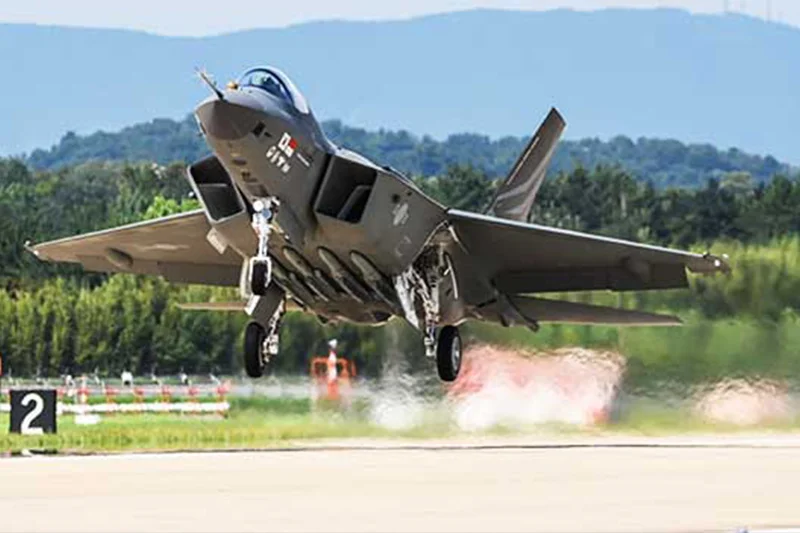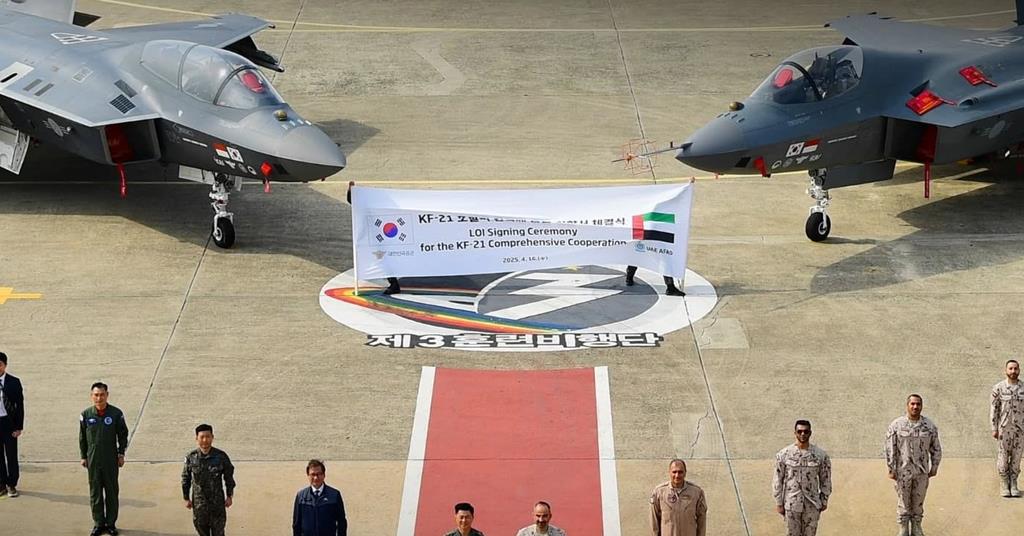In a significant move to boost military cooperation, the United Arab Emirates (UAE) and South Korea have signed a major agreement to collaborate on the KF-21 Boramae fighter jet program. This cooperation marks a new chapter in defense relations between the two countries, opening doors to technological exchange, joint operations, and long-term military partnerships.
The agreement, signed on April 16, 2025, at Sacheon Air Base in South Korea, is a letter of intent (LoI) for comprehensive cooperation on the KF-21 fighter project. The deal brings together two nations with growing defense ambitions and sets the stage for future developments in aerospace and military technology.
What the Agreement Includes
The letter of intent was officially signed by General Lee Young-su, Chief of Staff of the Republic of Korea Air Force (RoKAF), and Major General Rashed Mohammed Al Shamsi, Commander of the UAE Air Force and Air Defence. According to South Korean defense officials, this agreement allows the UAE to send military personnel to observe real-time KF-21 air drills and inspect operational units within the South Korean Air Force that use the fighter.
Additionally, both air forces will hold regular meetings—twice each year—to deepen collaboration. These meetings will focus on sharing strategic knowledge, air combat techniques, and the long-term goals for joint operations involving the KF-21 platform.

South Korea will also provide continued support for the UAE’s deployment of the Korean-made Cheongung-II air-defense systems, previously acquired in a landmark 2022 deal worth over $3.5 billion. The delivery and activation of those systems began in 2023 and were fully operational by early 2024. This support demonstrates a broader commitment to mutual defense development beyond fighter aircraft.
What is the KF-21 Boramae?
The KF-21 Boramae is a 4.5-generation multirole fighter jet developed by Korea Aerospace Industries (KAI), in collaboration with several defense partners. The name “Boramae” means “young hawk” in Korean, symbolizing speed, agility, and strength. Designed to eventually replace older models like the F-4 Phantom and F-5, the KF-21 represents a significant step forward in South Korea’s defense technology and aerospace independence.
Equipped with cutting-edge radar, advanced avionics, and stealth features, the KF-21 is capable of both air-to-air and air-to-ground missions. It is intended to serve as a powerful tool for modern air defense, offering a lower-cost alternative to 5th-generation jets like the F-35.
South Korea began serial production of the KF-21 in July 2024 after successfully completing flight testing and prototype evaluations. The country has already ordered an initial batch of 20 Block I aircraft, which are scheduled to be delivered between the end of 2026 and August 2027. These aircraft will be integrated into the Republic of Korea Air Force as the backbone of its future combat fleet.
Why This Matters for the UAE
The UAE has been steadily modernizing its air force and missile defense systems, aiming to stay ahead of regional threats while reducing its reliance on traditional Western defense partners. In recent years, the Gulf state has actively sought out new defense alliances, and this partnership with South Korea fits perfectly into its long-term military vision.
By cooperating with South Korea on the KF-21 project, the UAE gains access to advanced fighter jet technology without the geopolitical limitations that sometimes come with buying from the United States or Europe. This opens up new options for aircraft acquisition, joint development of components, and pilot training opportunities.
UAE defense officials are particularly interested in the KF-21 because of its advanced capabilities, affordability, and the opportunity to become a partner rather than just a buyer. If the partnership deepens, the UAE may also participate in co-development or even localized assembly of the aircraft in the future.
Moreover, as a country that has already invested heavily in South Korea’s Cheongung-II missile defense system, the UAE is clearly building a long-term defense strategy that includes South Korean technology as a key pillar.
Growing Defense Ties
This isn’t the first time the UAE and South Korea have worked together on defense. In 2022, the UAE signed South Korea’s largest arms deal to date, agreeing to buy the Cheongung-II medium-range surface-to-air missile system. That agreement laid the groundwork for increased trust and cooperation between the two nations, and now the KF-21 collaboration is taking things to the next level.
The new agreement also reflects a global shift in defense partnerships. Countries are increasingly moving away from long-standing traditional alliances and are instead choosing partners based on shared interests, economic advantages, and mutual technological goals. The UAE-South Korea relationship is a clear example of this modern trend in international defense relations.
What’s Next?
While this is currently a letter of intent and not a finalized fighter jet sale, it is seen by defense analysts as a critical step toward a formal agreement. If the partnership continues to grow, the UAE could become the first foreign buyer of the KF-21 fighter jet, potentially placing an order within the next one to two years.
Both nations are expected to continue joint discussions, expand military visits, and possibly explore joint production or technology sharing. For now, the agreement is a symbolic and strategic move that showcases trust, cooperation, and shared ambition.
Conclusion
The UAE’s decision to partner with South Korea on the KF-21 fighter jet program represents a powerful signal of its evolving defense strategy. At the same time, it gives South Korea an opportunity to grow its influence in the global defense market. The KF-21 project, once seen as a strictly national effort, is now turning into a truly international one.
As this partnership moves forward, both countries stand to benefit—militarily, politically, and economically. It could lead to the rise of a new era in defense cooperation, driven by innovation, mutual respect, and a shared goal of security and technological advancement.



